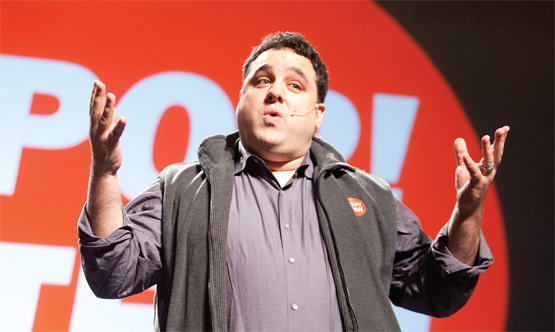Zolli & the Art of Bouncing Back
Andrew Zolli ’95 built PopTech into a renowned global social change incubator—a community of scientists, technologists, and designers tackling complex challenges from South Africa to Saudi Arabia. Now, he’s turned his attention to resilience—how to build systems that bounce back from crisis.

Andrew Zolli ’95 opens his new book, Resilience: Why Things Bounce Back, coauthored with journalist Ann Marie Healy, with an account of the “tortilla riots” of 2007, when tens of thousands of citizens converged on Mexico City to demonstrate against a sudden and frightening spike in the price of maize, a food staple. Although the protestors railed against many of the usual suspects—corrupt government, big business, wealthy landowners—these “were not, this time at least, the principal culprits,” write Zolli and Healy. “Indeed, the protestors could scarcely have guessed the truth: The slowly burning fuse that had ignited the explosion in corn prices had been lit several years before and a thousand miles away by a seemingly disconnected event—Hurricane Katrina.”
Working backwards, Zolli and Healy demonstrate that through a complex chain of events, the astronomical rise in the price of corn was connected to the rise in the price of oil; the two had become inextricably linked when Katrina spurred the shutdown of the Gulf refineries in 2005. When a speculative bubble in the oil markets later triggered a price spike in corn, the world soon witnessed what has become an alarming new trend—a food riot.
The authors’ point: No one could have predicted that Hurricane Katrina’s impacts in the Gulf and southern United States would trigger food shortages in mainland Mexico several years later. But as it turns out, the tortilla riots—and many other disruptions, from the Fukushima nuclear disaster to this summer’s massive blackout in India—reveal “the incomprehensible complexity, interconnectivity, and volatility of the modern world.”
“Globalization isn’t new,” says Zolli. But today, the economic systems and political systems and environmental systems are so interconnected in such un-obvious ways that the consequences of a disruption are virtually impossible to predict.”
In the face of such disruptions, Zolli and Healy explore resilience—the ability to persist, and even thrive, amid disruption. They share insights into how to build resilience into organizations, institutions, communities, economies, ecosystems, and even ourselves.
Zolli, Healy, and a team of researchers traveled from the coral reefs of Palau to the back streets of Palestine, and from military bases to cutting-edge neuroscience research labs, to explore patterns of resilience in different contexts. One of the patterns they identified is something called “clustering”—bringing together a density and diversity of resources. The biodiversity in an old-growth forest, for example, enables it to recover after a disruption such as a forest fire. Similarly, the plethora of talents, ideas, and cutting-edge tools in an innovation hub like Silicon Valley enable it to bounce back after a financial disruption.
Clustering, interestingly enough, is a big part of what Zolli does for a living. He’s the executive director and curator of PopTech (poptech.org), a global network of innovators working together to create positive change. PopTech is perhaps best known for its annual three-day mind-expanding conference in Camden, Maine. A gathering of 600 thought-leaders from wildly eclectic disciplines, past PopTech conferences have explored topics such as scarcity and abundance, and brilliant accidents and improbable breakthroughs. This year’s conference, no surprise, focused on resilience.
Less visible in the media but arguably more far reaching are PopTech’s fellow programs—the Social Innovation Fellows Program and the Science Fellows Program—supported by organizations such as the National Science Foundation, National Geographic Society, and Doris Duke Charitable Foundation. “People who are working at the forefront of their fields are typically organized in silos of excellence,” says Zolli. “If you’re working on an HIV vaccine, for example, you know the people who are doing the very best work in your field. But what often happens is that an innovation developed in silo A could be combined with an innovation in silo B that could have an implication for an effort in silo C. So you need horizontal networks that connect those silos, and that’s what PopTech does. We bring together ‘edge’ innovators in a range of disciplines and facilitate the conversation.”
PopTech is a perfect platform for a multidisciplinary thinker and doer like Zolli. A cognitive science major at Vassar, he created the first web interface for the college to introduce the college community to the wonders of the Internet. His plan after graduating was to head off to graduate school for doctoral work, but a large communications firm in New York City recruited him to help start up their new media practice. “My future wife said, ‘That’s great! We’re going to burn the futon! We’re going to get real furniture before you go off to graduate school and live on $14,000-a-year stipends!’ ”
He left the firm just before the dotcom crash and took what he refers to as “TBTO”—The Big Time Off—to revamp. “Three things came to the forefront,” he recalls. “First, I wanted to explore and have adventures. Second, I wanted a big part of my life to be about teaching and learning. And third, and most important, I wanted to organize my life centrally for social impact, to find new ways to use technology to solve social problems.” PopTech allowed him to do all three, from piloting experimental submarines, to lecturing at international technology forums, to incubating a massive HIV mobile communications initiative in South Africa.
Zolli radiates an infectious optimism about technology and its potential for bringing about positive change. But he’s also a realist. He points out that, in and of itself, technology is neither good nor bad. Resilience, too, is neither good nor bad. Crime syndicates are extraordinarily resilient, and the Internet is as much a vehicle for terrorists as it is for social innovators. “The hope is that the good guys outweigh the bad guys,” he says.
